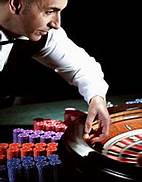Casino dealer on the gaming floor for 17 years, supervisor, and manager. I have first hand knowledge as well as considerable reading and research on my former art.

Short answer is no. The house edge on (almost) all roulette wagers is a steep 5.26%, so they do well with the inherent odds in the game.
The wheel travels counter clockwise with a decaying speed as it is manually pushed and spins off momentum. The ball is thrown clockwise, in a track with a very shallow slope meaning it is exceedingly difficult to predict where the ball will lose enough centrifugal force to fall. Other factors are “bumps” on the slope, diamond shaped in alternating vertical/horizontal pattern (they are almost always hit). Lastly the frets for each number are about 3cm and the ball rarely goes into a slot without bobbling. Also, there are several sized balls and several different brands of roulette wheels, all will behave slightly differently.
As far as the dealer goes…some feel they can hit a number, and they are successful about 1 in 38 throws (hmmm). Additionally, most of their pay comes from tips, so they genuinely want the tipping player to win. It does not happen any more often than probability would expect.
There was a group from University of California, Santa Cruz
(Thank you for the add, Paul Bostwick), that created a team with electronics that could calculate a fairly large section that the ball was more likely to drop into. They were marginally successful until their arrest. Again, their success had more to do with illegal equipment and use of mathematics, and nothing to do with the dealer.
Very rarely, one will find a design flaw in a cheaper roulette wheel that will tend towards a section, but that is not an advantage to the house and those wheels are soon retired (I’ve only seen that happen once after being around hundreds of wheels). Even then, the tendency would be so slight as to be almost undetectable and very difficult to profit from.
I have heard hundreds of times “Oh yeah, I can hit a section/number.” I call BS, I’ve looked at the profits and see no statistical evidence of that ability.










